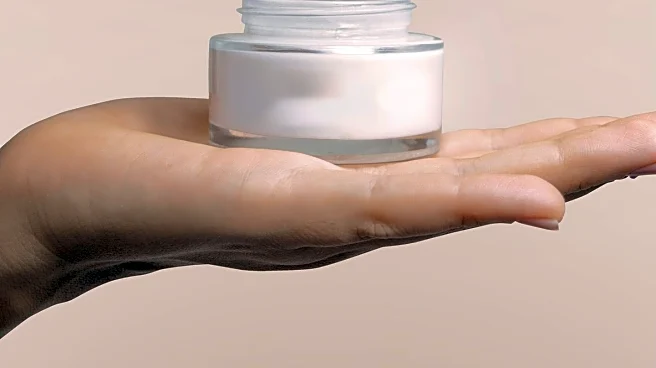What's Happening?
Almirall, a global biopharmaceutical company, has presented new long-term results from the POSITIVE study at the 34th Congress of the European Academy of Dermatology and Venereology 2025 in Paris. This study is the first real-world evidence (RWE) study in dermatology to use the World Health Organization Well-Being Index (WHO-5) as a primary endpoint. The study involved 785 adult patients with moderate-to-severe plaque psoriasis across nine European countries, all receiving tildrakizumab in routine clinical practice. The results demonstrated significant improvements in skin clearance, psychological well-being, and quality of life over a two-year period. The study highlights a paradigm shift towards holistic management of psoriasis, aligning with the WHO's health definition and recent resolution on skin diseases.
Why It's Important?
The findings from the POSITIVE study underscore the importance of a holistic approach to managing psoriasis, a condition that significantly impacts patients' social, psychological, and physical quality of life. By incorporating psychological well-being as a primary outcome, the study provides a comprehensive view of treatment success, demonstrating that advanced therapies can significantly improve patients' overall quality of life. This approach aligns with the WHO's call for integrated dermatology care and sets a new standard for patient-centered dermatological care. The study's results could influence future treatment protocols and encourage the adoption of similar holistic approaches in other areas of medical dermatology.
What's Next?
The POSITIVE study's results will likely prompt further research into holistic treatment approaches for dermatological conditions. Almirall's commitment to advancing patient-centered care is expected to continue, with ongoing research and development in dermatology. The study's findings may also influence healthcare policies and practices, encouraging a broader adoption of holistic treatment models that consider psychological and social factors alongside physical health outcomes. Additionally, the study's success may lead to increased collaboration between biopharmaceutical companies and healthcare providers to improve patient outcomes in dermatology.
Beyond the Headlines
The POSITIVE study's focus on psychological well-being and partner impact reflects a growing recognition of the broader implications of chronic conditions like psoriasis. By addressing these aspects, the study not only improves patient outcomes but also reduces the burden on caregivers and families. This approach could lead to a shift in how chronic conditions are managed, emphasizing the importance of mental health and social support in treatment plans. The study also highlights the potential for real-world evidence to drive innovation in healthcare, providing valuable insights that can inform clinical practice and policy.









